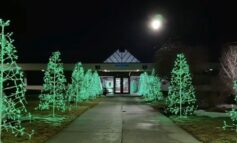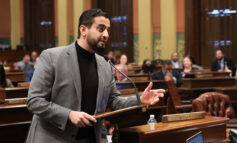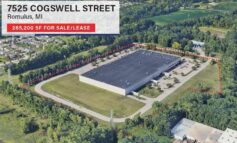
|
| Israeli soldiers look on as Palestinian homes are demolished |
NEW ORLEANS — A sense of unease set in Albert Asfour as the tourist bus he was in rolled to a stop. Young Israeli soldiers at a checkpoint looked unhappy with the group leader and the handful of American students, who were heading to Jerusalem from Ramallah for an educational trip.
Then, loud bangs rang out. Shots were being fired at a nearby trash can, followed by shots at the bus.
He shook with terror as a soldier threw a thunderous stun grenade under the bus.
The driver of the bus, which was clearly marked as belonging to a Christian church, quickly turned around.
Asfour, a Palestinian American engineer, gave his testimony of the incident that occurred in 2004, along with other accounts of mistreatment of natives in the region they witnessed, at a national assembly for the Evangelical Lutheran Church in America, which ended last Saturday.
At the assembly, the Lutheran Church issued resolutions to push for the cessation of future aid to Israel, investigations of human rights abuses occurring with U.S. aid and to urge U.S. officials to recognize Palestine at the United Nations; and in association with the U.N. Security Council, to “offer a new, comprehensive and time-bound agreement to the governments of Israel and Palestine, resulting in a negotiated final status agreement between Israel and Palestine, leading to two viable and secure states with a shared Jerusalem.”
Pastor Jack Eggleston, assistant to the bishop in Southeast Michigan’s Lutheran Church Synod, said the church is rising up against the “illegal” Israeli occupation to stand with suffering Palestinian people, 20 percent of whom he said are Christians.
“The occupation in the West Bank is wrong,” Eggleston said. “We’ve see what it’s done to the church and what its done to the people.”
With almost four million members and 10,000 congregants nationwide, he added the significant position could help counter the narrative of fear around Arabs and Muslims in the Middle East.
Dave Upmeyer, president of Middle East task force for the Southeast Michigan synod, said the vote, which passed overwhelmingly, sends a strong international message to educate people on the reality of the strife in the area.
Upmeyer said the group met with school students and church congregants and heard first-hand accounts of what life is like. He said residents cannot get to work, school or church, because of the wall separating Gaza and the rest of the country.
“You quickly realize there is another side of the issue from what may be commonly understood,” Upmeyer said.
Asfour, who immigrated to Michigan almost 60 years ago, said he is ashamed by the Arab American community’s growing indifference to the Palestine struggle.
He said Palestinians are treated like second-class citizens in their country, where travel is severely restricted.
In Gaza, water is rationed and in many areas, it is only available via expensive water tanks, Asfour said. Walk 200 yards and one can spot pools and water fountains in the Israeli municipalities. He added trash is not collected and homes are destroyed. In his hometown, five houses of refugees are in the process of being demolished. School kids are killed or pushed against walls by checkpoint soldiers who search their bags.
Asfour has personally witnessed these scenarios.
“Palestine are going through hell,” he said. “They’re smiling, but they’re hurting on the inside.”
He urged Arabs and allies in Metro Detroit to “wake up” and support their Arab neighbors by calling their representatives and senators to call for reform in the treatment of natives there.
“We’re refugees, we left our homes and the only thing we have is the key,” he said. “We don’t have the right to our home; we don’t have rights at all.”





Leave a Reply